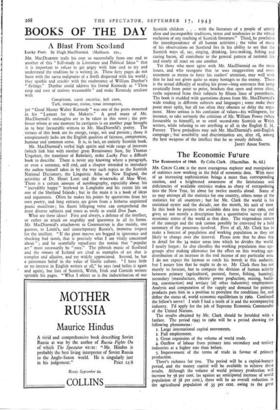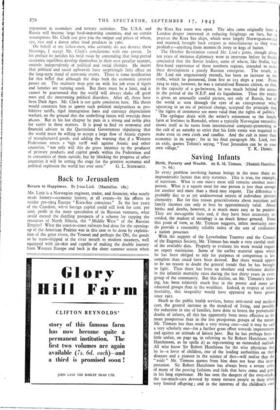The Economic Future
The Economics of 1960. By Colin Clark. (Macmillan. Ss. 6d.)
MR. COLIN CLARK iS the most courageous explorer and manipulator of statistics now working in the field of economic data. With most
of us increasing sophistication brings a more than corresponding caution, and a heightened awareness of the limitations and deficiencies of available statistics makes us chary of extrapolating into the New Year, let alone for twelve months ahead. Some of us may attempt all the statistics for one country, others some of the statistics for all countries ; but' for Mr. Clark the world is his statistical oyster and the decade, not the month, his unit of time.
In this book he projects the available data into the year 196o, and gives us not merely a description but a quantitative survey of the economic status of the world at that date. The stupendous nature
of the concept and the task cannot possibly be conveyed by a bald summary of the processes involved. First of all, Mr. Clark has to
make a forecast of population and' working population as they are likely to change over ,the interval. Please note that he does this in detail for the 34 major areas into which he divides the world.
I nearly forgot : he also classifies the working population into age- groups after making allowance for the effect on this working age- distribution of an increase in the real income of any particular area.
I do not expect the layman to catch his breath at this audacity, but I assure him that he ought to do so. Mr Clark then has not merely to forecast, but to compute the division of human activity between primary (agricultural, pastoral, forest, fishing, hunting), secondary (manufacture, electric power production, mining, build- ing, construction) and tertiary (all other industries) employment.
Analysis and computation of the supply and demand for primary products puts him in a position to postulate the conditions for, and define the status of, world economic equilibrium in 1960. Confound the fellow's nerve! I wish I had a tenth of it and the accompanying industry. I'd apply for the job of Supreme Economic Commander of the United Nations.
The results obtained by Mr. Clark should be heralded with a fanfare. The period 1945 to 1960 will be a period showing the following phenomena :
x. Large international capital movements.
2. Full employment.
3. Great expansion of the volume of world trade. 4. Outflow of labour from primary into secondary and tertiary industries at a higher rate than before.
5. Improvement of the terms of trade in favour- of primary production. There's richness for you. The period will be a capital-hungry period, and the money capital will be available to achieve these results. Although the volume of world primary production will increase by 56 per cent. (as against an anticipated increase of world population • of 3$ per cent.), there will be an overall reduction in the agricultural population of 35 per cent. owing to the great expansion in secondary and tertiary activities. The. U.S.A. and Russia will become large food-importing countries, and on certain assumptions. Mr. Clark can give You the output and prices of wheat, rye, rice .and a dozen other -food products in 196o.
On behalf of my fellow-men, who certainly do not deserve these blessings, I accept Mr. Clark's conclusions with one caveat. In his preface he justifies his bold essay by contending that long-period economic equilibria develop themselves in their own peculiar manner, entirely independently of political and social changes. He insists that political and social upheavals have surprisingly little effect on the long-term trend of economic events. There is some justification for this beta that although the dogs bark the economic caravan passes on. The ordinary man gets on with his job even if tigers and lunatics are running amok. But there must be a limit, and it cannot be guaranteed that the world will always shake off great wars and the intervening political disorders. After all, there have been Dark Ages. Mr. Clark is not quite consistent here. His thesis would constrain him to ignore such political malpractices as pro- hibitive tariffs, rigid immigration bans and currency depreciation warfare, on the ground that the underlying forces will override these abases. But in his last chapter he puts in a strong and noble plea for sanity in these matters. It is good to find an economic and financial adviser to the Queensland Government stipulating that the world must be willing to accept a large flow of Asiatic exports of manufactured goods, and adding the warning that if a Western Federation erects a high tariff wall against Asiatic and other countries, " not only will this do grave injustice to the producer of primary products and capital goods within the Federation and to consumers of them outside, but by blocking the progress of other countries it will be setting the stage for the greatest economic and
political explosion the world has ever seen." G. L. SCHWARTZ.



























 Previous page
Previous page